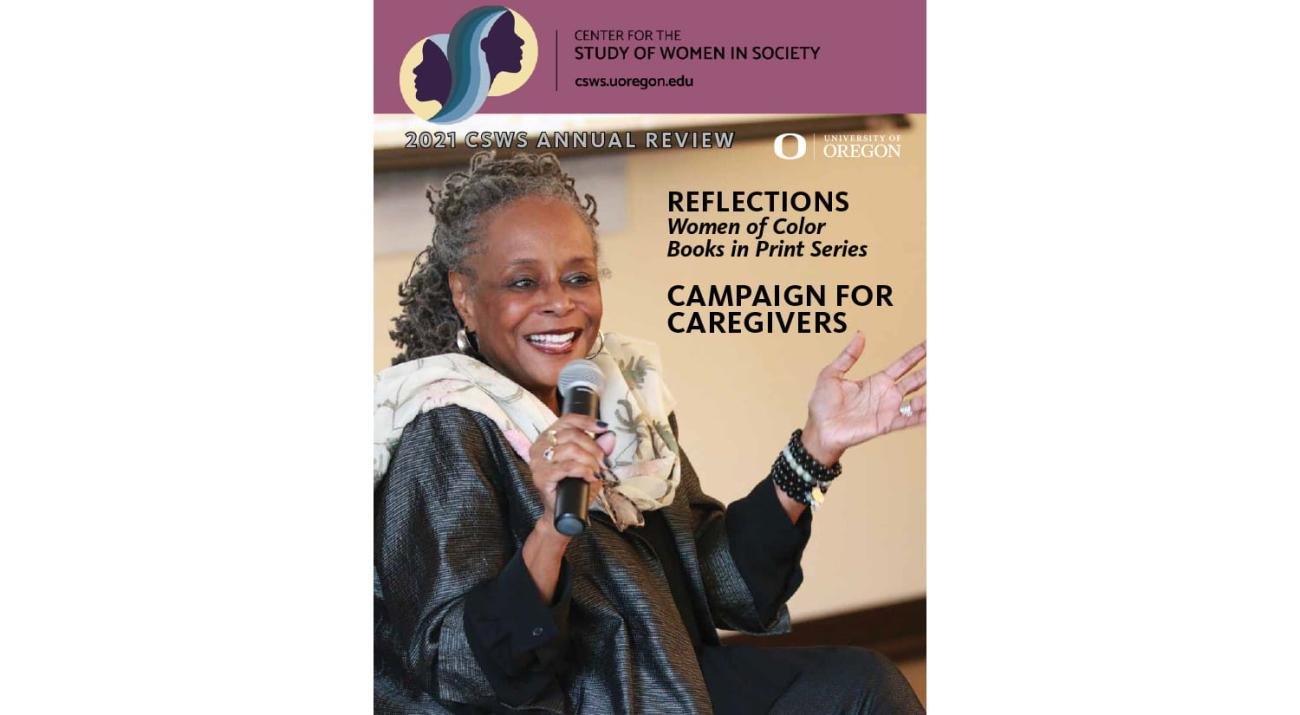
2020-21 academic year at University of Oregon was like no other. With campus shut down due to COVID-19, faculty, staff, and students with families juggled caregiving responsibilities alongside working from home. With travel curtailed or impossible, researchers postponed or changed their projects to suit our new pandemic reality. The 2021 [embeddoc url="https://wordpress-2-csws.ddev.site:8443/wp-content/uploads/2021/11/2021_CSWS_Annual-Rvw_FINAL_WEB.pdf" download="all" viewer="google"] reflects these changed conditions and the impacts they have had on the life of our community.
Law professor Michelle McKinley opens the issue with “A Year In Review,” which marks her final report as CSWS director after five years of service.
Interim Director Sangita Gopal, associate professor of cinema studies, discusses in an interview her goals for CSWS during this transition year. Rather than investing in programming while pandemic conditions make in-person gatherings uncertain, Gopal will focus on strengthening the Center’s infrastructure for the next director and starting the first stages of planning for our 50th Anniversary in 2023.
Two feature stories explore some of the Center’s activities over the pandemic year. The first story dives deeper into the origins and outcomes of the Caregiver Campaign, a CSWS advocacy project seeking policy changes to ameliorate impacts of the pandemic for caregivers in the UO community. Beginning with an open letter to UO leadership in June 2020, the campaign helped to increased awareness of how institutional practices have historically rendered certain labor invisible and left women and minorities more vulnerable.
The second story focuses on our 2021 Women of Color Books in Print virtual event series and features reflections from our graduate students. Anthropology PhD candidate Polet Campos-Melchor shares how she was moved by Ana-Maurine Lara’s discussion of Black feminist practice in her work and life during the Jan. 29 book event for Streetwalking: LGBTQ Lives and Protest in the Dominican Republic and Queer Freedom : Black Sovereignty. Anthropology student Kiana Nadonza discusses her increased confidence in her beauty pageantry research because of Oluwakemi Balogun’s work and the Mar. 5 discussion of Beauty Diplomacy: Embodying an Emerging Nation. Education PhD student Roshelle Weiser-Nieto appreciates the practical tools for culturally-relevant teaching in Leilani Sabzalian’s Indigenous Children’s Survivance in Public Schools, featured April 23 in the virtual book event series. Finally, English PhD candidate Teresa Hernández reflects on her own relationship to digital game play and its racial discourse after listening to a discussion of Tara Fickle’s The Race Card: From Gaming Technologies to Model Minorities. In a related story, we also introduce our new WOC Project convenor, anthropology professor Gyoung-Ah Lee.
While many of our recent research grant recipients have had to delay their research due to the pandemic, we include in this issue reports from two faculty who were able to continue work last year. Judith Raiskin, associate professor of women’s, gender, and sexuality studies, gives us an update on the Eugene Lesbian History Project website, Outliers and Outlaws, and how the digital humanities project came into being. Also, sociology professor Ellen Scott shares her research team’s co-authored report, “#ForeverEssential: What Does it Mean to be a Low-wage Essential Worker in the Age of COVID-19?”
Seven graduate students report on their research progress and the impacts of the pandemic on their projects. Jane Grant Fellowship winner Cristina Faiver-Serna, geography, explains the origins of her PhD dissertation and how the pandemic changed her approach in “M(other)work of Survival and the Pandemic as Teacher.” Doctoral candidate Parichehr Kazemi, political science, describes her online research into Iranian women and girls who are defying the nation’s strict hijab mandate by posting publicly unveiled images of themselves in “‘My Stealthy Freedom’: Feminist Resistance through Social Media in Iran.” Doctoral candidate Molly McBride, anthropology, tells how her research with a Michigan women’s chorus unfolded in surprising ways over the past year in “Tempos of Zoom Ethnography: Singing with a Women’s Chorus in the Pandemic.”
In addition, doctoral candidate Stephanie Mastroefano, English, describes her research into the role of women in the unionization of animation workers and the 1941 Disney Studio strike in “Breaking the Celluloid Frame: The Women at the Margins of Disney Animation.” Doctoral candidate Lara Boyero Agudo, Romance languages, describes how her research shows Spanish-speaking immigrant women are exposed to more racial discrimination in Oregon in “Soy mujer, inmigrante y latina: An Intersectional Study of Linguistic Capital among Latina Women Immigrants in Oregon.” Doctoral candidate Polet Campos-Melchor, anthropology, discusses her research on how trans asylum seekers in Ciudad Juarez look out for each other in “El Noa Noa: Strategies of Love and Care at the U.S.-México border.” Finally, doctoral candidate Katherine M. Huber, English, reflects on how the pandemic and racial injustice protests influenced her research on Ireland’s complex history as a colonized nation in “Urgent Pauses: A Reflection on my Renewed Commitment to Rigorous Research.”
The 2021 CSWS Annual Review can be read online here: /sites/default/files/old-wp-uploads/2021/11/2021_CSWS_Annual-Rvw_FINAL_WEB.pdf. Past issues also can be accessed on the CSWS website.
To get receive print copies of the issue, please email jenee@uoregon.edu with your mailing information.

